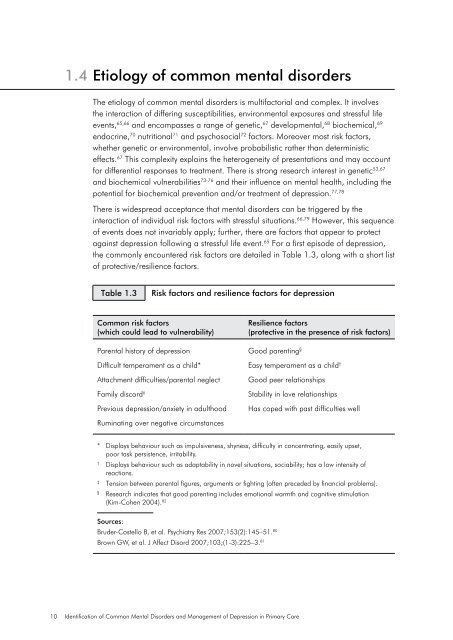Common Mental Disorders Depression - New Zealand Doctor
Common Mental Disorders Depression - New Zealand Doctor
Common Mental Disorders Depression - New Zealand Doctor
You also want an ePaper? Increase the reach of your titles
YUMPU automatically turns print PDFs into web optimized ePapers that Google loves.
1.4 Etiology of common mental disorders<br />
The etiology of common mental disorders is multifactorial and complex. It involves<br />
the interaction of differing susceptibilities, environmental exposures and stressful life<br />
events, 65,66 and encompasses a range of genetic, 67 developmental, 68 biochemical, 69<br />
endocrine, 70 nutritional 71 and psychosocial 72 factors. Moreover most risk factors,<br />
whether genetic or environmental, involve probabilistic rather than deterministic<br />
effects. 67 This complexity explains the heterogeneity of presentations and may account<br />
for differential responses to treatment. There is strong research interest in genetic 53,67<br />
and biochemical vulnerabilities 73-76 and their influence on mental health, including the<br />
potential for biochemical prevention and/or treatment of depression. 77,78<br />
There is widespread acceptance that mental disorders can be triggered by the<br />
interaction of individual risk factors with stressful situations. 66,79 However, this sequence<br />
of events does not invariably apply; further, there are factors that appear to protect<br />
against depression following a stressful life event. 65 For a first episode of depression,<br />
the commonly encountered risk factors are detailed in Table 1.3, along with a short list<br />
of protective/resilience factors.<br />
Table 1.3<br />
Risk factors and resilience factors for depression<br />
<strong>Common</strong> risk factors<br />
(which could lead to vulnerability)<br />
Resilience factors<br />
(protective in the presence of risk factors)<br />
Parental history of depression Good parenting §<br />
Difficult temperament as a child* Easy temperament as a child †<br />
Attachment difficulties/parental neglect<br />
Family discord ‡<br />
Previous depression/anxiety in adulthood<br />
Ruminating over negative circumstances<br />
Good peer relationships<br />
Stability in love relationships<br />
Has coped with past difficulties well<br />
* Displays behaviour such as impulsiveness, shyness, difficulty in concentrating, easily upset,<br />
poor task persistence, irritability.<br />
†<br />
Displays behaviour such as adaptability in novel situations, sociability; has a low intensity of<br />
reactions.<br />
‡<br />
Tension between parental figures, arguments or fighting (often preceded by financial problems).<br />
§<br />
Research indicates that good parenting includes emotional warmth and cognitive stimulation<br />
(Kim-Cohen 2004). 82<br />
Sources:<br />
Bruder-Costello B, et al. Psychiatry Res 2007;153(2):145–51. 80<br />
Brown GW, et al. J Affect Disord 2007;103;(1-3):225–3. 81<br />
10<br />
Identification of <strong>Common</strong> <strong>Mental</strong> <strong>Disorders</strong> and Management of <strong>Depression</strong> in Primary Care

















